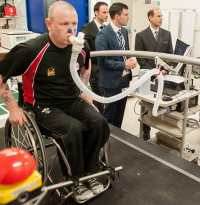New study to help disabled people get more active

Following the success of para-athletes taking part in the Glasgow 2014 Commonwealth Games, researchers in our Department for Health are embarking on a new study to understand more about the benefits of moderate-intensity exercise for wheelchair users with spinal cord injuries.
Up to 35,000 people in the UK are affected by spinal injuries with estimates suggesting that up to three new people a day sustain life-changing injuries that leave them wheelchair-bound.
For people with such injuries, research suggests that lifestyle diseases, such as type-2 diabetes and heart disease, are more likely to occur and at an earlier age. Now the researchers want to know more about the links between physical activity and health among this population so that they can inform recommendations which could improve the lives of wheelchair-users around the world.
As part of the study, the researchers from our Centre for DisAbility Sport and Health (DASH) are looking to recruit 24 men and women from all around the UK who would come to Bath to take part in the study. Participants must be aged 18 – 65, and have sustained a spinal cord injury at some point in their lives.
Tom Nightingale, a researcher working on the project, explained: "One of the best ways to reduce the risk of chronic diseases is to become more physically active. However, at present, there is a lack of evidence as to whether or not moderate-intensity exercise has positive effects on metabolic control, body composition – the amount of fat and muscle in the body – and the immune function of individuals with spinal cord injuries.
"Through our study we want to gain a better understanding about why exercise might exert positive effects on a variety of biological functions in the body – particularly in this population."
Volunteers taking part in the study will be randomly assigned into two groups: a control group and an exercise group. Participants in the control group will be asked to continue with their normal lifestyle patterns, whilst the exercise group will be asked to complete 45 minutes of moderate-intensity exercise four times a week over a 6-week period using an 'arm crank' in their own homes. The results will enable the researchers to investigate the impact of home-based exercise programs on markers of health and fitness for people with a spinal cord injury.
Participants will also be asked to spend two mornings in the laboratory (six weeks apart), during which they will be able to read, work, watch television or a DVD. If assigned to the exercise group participants will be provided with an 'arm crank ergometer' to use in their own home, avoiding repeated visits to the University.
Dr Jean-Philippe Walhin, Susan Whorrod Research Fellow also working on the project, added: "There are great personal benefits for volunteers who take part in our research. Participants will receive detailed personalised feedback, including blood measurements for cholesterol, glucose and insulin, as well as physical activity levels, dietary analysis, plus accurate measurements for their body composition and fitness."
Emma Spring, Research & Insight Manager for the English Federation of Disability Sport (EFDS) said: "There is a significant lack of data around the level and intensity of physical activity that can provide benefits for disabled people. Any research which increases our knowledge and awareness of the impact of physical activity on disabled people is warmly received."
In return for taking part in the study, participants will also receive a £50 voucher. Travel expenses, lunch costs and overnight stays where necessary will also be reimbursed.



















